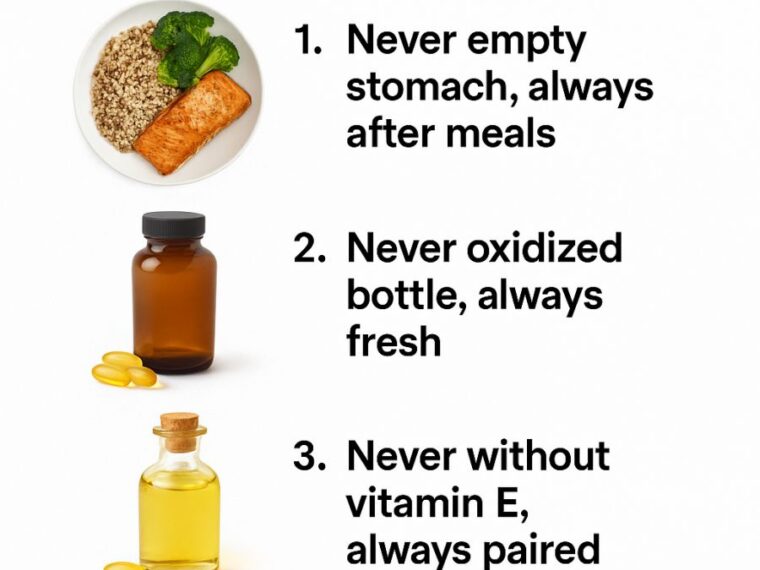Omega-3 fatty acids have gained significant attention over the years for their myriad health benefits, from supporting heart health to enhancing cognitive function. Despite their popularity, many people are unaware of how to properly incorporate omega-3 supplements into their daily routine. This oversight can lead to less-than-optimal results and, in some cases, unnecessary side effects.
In this article, we aim to dispel common misconceptions and provide you with a comprehensive guide to taking omega-3 the right way. From the importance of timing and dosage to storage and quality considerations, we will explore everything you need to know to maximize the benefits of these essential fatty acids.
1. The Importance of Omega-3 for Your Health
Omega-3 fatty acids are crucial for maintaining a healthy body and mind. They are essential fats, meaning the body cannot produce them on its own, so they must be obtained from diet or supplements. The three main types of omega-3s are ALA (alpha-linolenic acid), DHA (docosahexaenoic acid), and EPA (eicosapentaenoic acid). While ALA is primarily found in plant oils, DHA and EPA are abundant in fish oils and are most beneficial for human health.
Studies have shown that omega-3s play a critical role in heart health by reducing triglyceride levels, lowering blood pressure, and decreasing the risk of heart disease. They are also known to support brain health, with research suggesting that adequate intake of DHA and EPA can improve cognitive function and reduce the risk of neurodegenerative diseases. Furthermore, omega-3s have anti-inflammatory properties, which can help alleviate symptoms of chronic inflammatory conditions such as arthritis.
2. Why Timing Matters: Always Take Omega-3 After Meals
The timing of when you take your omega-3 supplement can significantly impact its absorption and effectiveness. It is generally recommended to take omega-3 supplements with meals, particularly those containing fats. This is because omega-3s are fat-soluble, meaning they need the presence of dietary fat to be properly absorbed by the body.
Taking omega-3s on an empty stomach may reduce their absorption, leading to less pronounced health benefits. By consuming your omega-3 supplement with a meal that includes healthy fats such as avocados, nuts, or olive oil, you can enhance the bioavailability of these essential fatty acids, ensuring that your body can utilize them effectively.
3. Freshness Is Key: Avoid Oxidized Omega-3 Supplements
The quality of omega-3 supplements can vary greatly, and one of the most important factors to consider is freshness. Omega-3 fatty acids are prone to oxidation, which can lead to the formation of harmful free radicals. Oxidized omega-3s not only lose their potency but can also have negative health effects.
To ensure you are getting a fresh product, look for omega-3 supplements that are stored in dark, airtight containers and have been tested for oxidation levels. Reputable brands will often provide information about the peroxide value or TOTOX (total oxidation) value on their labels. A low TOTOX value indicates a fresher, higher-quality product.
4. The Role of Vitamin E: Why Pairing Is Essential
Vitamin E is a powerful antioxidant that can help protect omega-3 fatty acids from oxidation, both in supplements and within the body. Many high-quality omega-3 supplements include vitamin E to enhance their stability and shelf life.
When taking omega-3 supplements, consider choosing a product that includes vitamin E or supplementing with vitamin E separately. This pairing can help maximize the health benefits of omega-3s by preventing their degradation and ensuring they remain effective until your body absorbs them.
5. Storage Tips: Keep Your Omega-3 Cool and Safe
Proper storage of omega-3 supplements is essential to maintain their potency and prevent oxidation. Omega-3 supplements should be kept in a cool, dark place, such as a refrigerator, to slow down the oxidation process. Exposure to heat, light, and air can all contribute to the degradation of omega-3s.
If your omega-3 supplements come in a liquid form, make sure to seal the container tightly after each use. For capsules, keep the lid closed and store them in a dark location. By following these storage tips, you can help ensure that your omega-3 supplements remain fresh and effective.
6. Identifying Quality: How to Choose the Best Omega-3 Supplement
With so many omega-3 supplements on the market, choosing the right one can be daunting. Quality is of utmost importance, and several factors can help you identify a superior product. Look for supplements that provide clear information about the source of the omega-3s, such as wild-caught fish oil. The ratio of DHA to EPA should also be specified, as different ratios may be more beneficial for specific health goals.
Additionally, third-party testing and certification for purity and potency are important indicators of quality. Organizations like IFOS (International Fish Oil Standards) provide independent testing and certification, ensuring that the supplements meet high standards for safety and content. Opt for brands that are transparent about their testing and provide easy access to the results.
7. Debunking Myths: Common Misconceptions About Omega-3
Despite the widespread use of omega-3 supplements, several myths persist regarding their consumption. One common misconception is that all omega-3s are the same. In reality, ALA, DHA, and EPA have different roles and benefits, with DHA and EPA being particularly important for heart and brain health.
Another myth is that taking more omega-3s will exponentially increase health benefits. However, balance is key. Excessive intake can lead to side effects such as bleeding or immune system suppression. Understanding the differences between omega-3 types and following recommended dosages can help avoid these pitfalls and optimize your health outcomes.
8. Dosage Guidelines: Finding the Right Amount for You
Determining the right dosage of omega-3 can depend on various factors, including age, health status, and dietary intake. For general health, experts typically recommend a daily intake of 250–500 mg of combined DHA and EPA. For specific health concerns, such as high triglyceride levels or inflammation, higher doses may be beneficial, but it is essential to consult with a healthcare provider.
It is also important to account for any omega-3s you may be obtaining from your diet, primarily through fatty fish like salmon, mackerel, and sardines. Balancing dietary intake with supplementation can help you achieve the optimal dosage for your needs without risking overconsumption.
9. Vegan and Vegetarian Options: Plant-Based Omega-3 Sources
For those following a vegan or vegetarian diet, obtaining sufficient omega-3s can be challenging, as most supplements are derived from fish oil. However, plant-based sources of omega-3, primarily ALA, are available through flaxseeds, chia seeds, and walnuts. While ALA can convert to DHA and EPA in the body, the conversion rate is low.
Fortunately, algae-based supplements offer a direct source of DHA and EPA, suitable for vegans and vegetarians. These supplements are derived from microalgae, providing a sustainable and effective alternative to fish oil. When choosing plant-based omega-3 supplements, ensure they provide adequate levels of DHA and EPA to meet your dietary requirements.
10. Understanding Labels: What to Look for in Omega-3 Products
Reading labels is crucial when selecting an omega-3 supplement, as it can provide valuable information about the product’s quality and content. Key details to look for include the source of the omega-3s, the amount of DHA and EPA per serving, and any additional ingredients such as vitamin E or flavorings.
Labels should also indicate whether the product has been tested for contaminants like mercury and heavy metals. Certifications from third-party organizations can further assure quality and safety. By understanding these labels, you can make informed decisions and choose a supplement that aligns with your health goals.
11. The Risks of Overconsumption: When More Isn’t Better
While omega-3s are beneficial, consuming them in excessive amounts can lead to adverse effects. High doses of omega-3s can increase the risk of bleeding, particularly if you are taking blood-thinning medications or have a bleeding disorder. They may also suppress immune function or cause gastrointestinal discomfort
To avoid these risks, adhere to recommended dosages and consult with a healthcare provider before starting a new supplement regimen, especially if you have underlying health conditions. By following guidelines and monitoring your intake, you can safely enjoy the numerous benefits of omega-3s without compromising your health.




